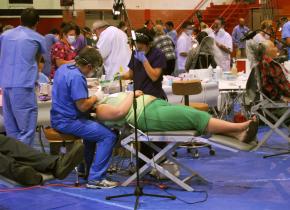Getting health care to those who need it
For one week in August, Remote Area Medical set up a free clinic in the Los Angeles Forum, offering much needed care to thousands of people who lined up to get in.
Hugh Moore, a registered nurse, volunteered at the clinic. Moore is also secretary of the activist group Healthcare for All-San Diego and co-chair of the San Diego Green Party. He spoke with about his experience in LA prior to a forum on single-payer health care co-sponsored by the International Socialist Organization and the San Diego Green Party.
CAN YOU explain the goals of the Remote Area Medical (RAM) clinic in Los Angeles and how it was set up?
THE OVERALL goal of RAM is to provide medical, dental, and ophthalmic services to indigent peoples. When this organization was set up, it first went to developing countries, including Honduras and South Africa, to set up clinics. As time went by, the group realized that the same need for care existed in Tennessee, where it's based. It started running programs in rural areas of Georgia and Tennessee.
This clinic in Los Angeles was the first time setting up a clinic in a metropolitan area. RAM didn't come to LA with the intention of making a political statement, but the people in LA who invited them, including Rep. Maxine Waters, intended to highlight the severity of the health care crisis.
The intent of RAM was to see 8,000 patients over seven days. If you walked into the Forum, you would have seen 60 dentist chairs, two semi-trailers for making eyeglasses, and 30-40 eye exam machines. The medical doctors were working in the Forum's dressing rooms.

Unfortunately, because of U.S. laws, all providers had to be licensed in the state of California. Therefore, they were limited in the number of people they could see. On the first day, they passed out 1,500 numbers between 3 and 4 a.m. By 5 a.m., the clinic had already begun turning people away. Some people began lining up at 10 p.m. the night before.
WHAT TYPES of treatment did patients come in for?
MOSTLY WHAT I saw was dental patients--people who had gone to the dentist and been told they needed a root canal or a tooth extraction. They couldn't afford the procedures, so they went home to live with it. The amazing thing was that most of them had insurance, but they still couldn't afford to pay the high co-pays and deductibles.
Many people also needed glasses and hadn't had a new pair in many years. Some people came for routine physicals, and the doctors were doing mammograms and pap smears. Of course, many people also came because they were in pain and couldn't get any care anywhere else. Unfortunately, RAM did not have access to a free pharmacy supply, so their ability to deal with some conditions was limited.
One woman was there who had been to the emergency room one week earlier after passing out in her home. Her problem was blood pressure, but they gave her prescriptions she couldn't afford. Her blood pressure was out of control when she got to us. I don't know the final resolution of her case, but she did get to see a doctor.
WHY HAVE you chosen to advocate for single-payer health care?
I STARTED working in health care in the Navy. The Navy has a single-payer system. When a patient walks through the front door, you only ask them, "What's wrong?"
Later, I went to work for a "premier" private health system. If a patient walked through the front door there, I was required not to speak to them before they saw a receptionist. If a nurse or doctor speaks to someone in need to help, they are ethically required to treat them. To avoid this, all patients have to stop at a front desk before making any contact with a provider.
The idea that there's a gatekeeper for care--not a doctor, but an insurance company: That's what showed me how clearly the current system is failing. When I looked at my experience in the Navy, the care was fantastic. It became clear to me that the only answer is single-payer. The public option will never work; even the General Accounting Office has admitted that. Why hasn't the GAO scored single-payer? Because it's the only one that would work, and if they scored it, and it was shown to work, it couldn't be kept off of the table.
WHAT DO you think the next step should be in the fight for single-payer?
THE NEXT step here is to fight for SB 810, the California single-payer legislation. Just like the Canadian system, which started with one province, this is the only viable option. Social Security was adopted in California before expanding to the rest of the country. I think that we can do the same for health care.
It is so embarrassing that I'm a nurse, working in what is supposedly the best health care system in the world, and yet I find myself volunteering with RAM to give care to people in LA that they can't get. I am a veteran, and I believe my country is more than that. This system is unfair, capitalistic and without bounds.


